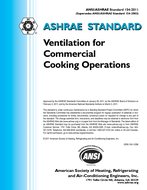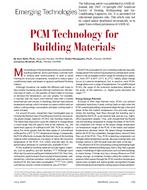At. a time when good engineering practice for large pollutant. sources is to propose stacks 1.5 times the height of associated buildings, there is still a large use of mini-chimneys and flush vents on buildings to disperse effluents from small process activities. Such designs may result in problems ranging from offensive odors, fire hazards, and product corrosion, even to reentry of toxic contaminants. Most predictive procedures and measurements relate to long-time average concentrations, but flammability, toxicity, and odor are short-time problems and intermittent in nature. Recent measurements of fluctuating concentration statistics near model buildings in the wind-engineering laboratory together with probability mathematics permits estimation of odor hazards and a positive design response.
Units: I-P
Citation: Symposium, ASHRAE Transactions, 1985, vol. 91, pt. 2B, Honolulu, HI
Product Details
- Published:
- 1985
- Number of Pages:
- 14
- File Size:
- 1 file , 820 KB
- Product Code(s):
- D-HI-85-34-3


